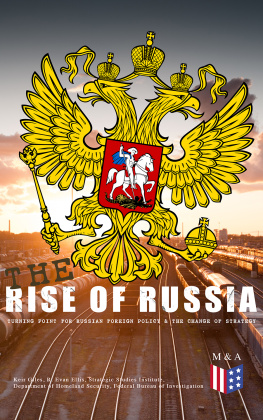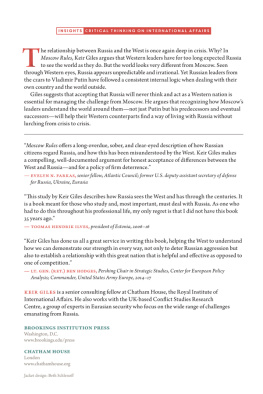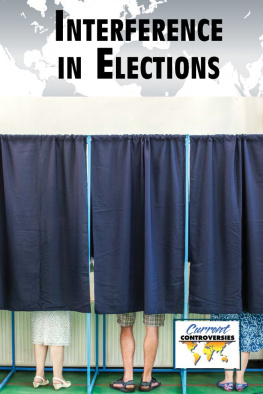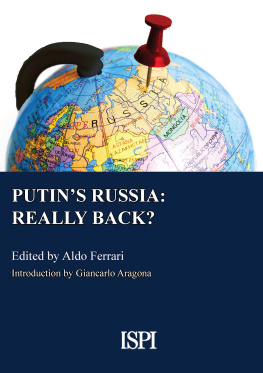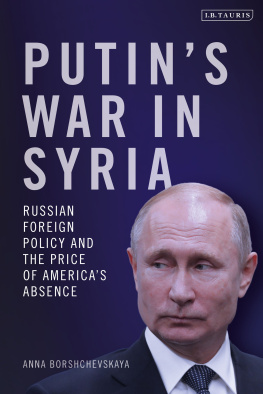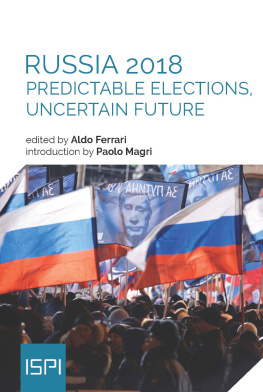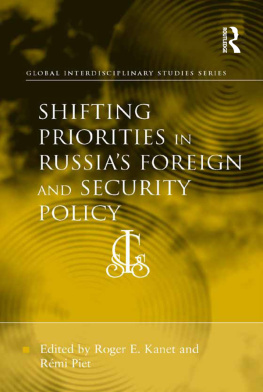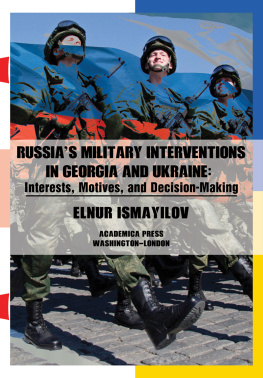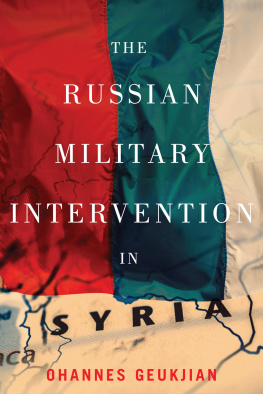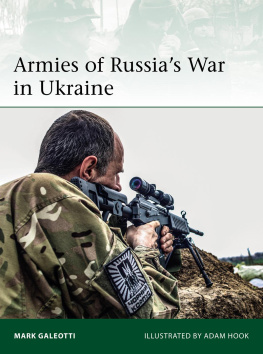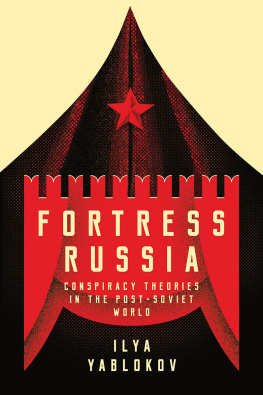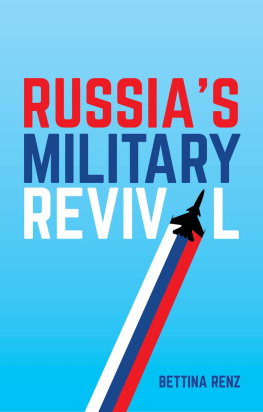Keir Giles, R. Evan Ellis, Strategic Studies Institute, Department of Homeland Security, Federal Bureau of Investigation
The Rise of Russia - Turning Point for Russian Foreign Policy & The Change of Strategy
Russias Military Interventions in Ukraine and Syria, Interference With the U.S. Presidential Elections, Engagement With Latin America & Interests in Sub-Saharan Africa
Madison & Adams Press, 2017. No claim to original U.S. Government Works
Contact
ISBN 978-80-268-7962-6
This is a publication of Madison & Adams Press. Our production consists of thoroughly prepared educational & informative editions: Advice & How-To Books, Encyclopedias, Law Anthologies, Declassified Documents, Legal & Criminal Files, Historical Books, Scientific & Medical Publications, Technical Handbooks and Manuals. All our publications are meticulously edited and formatted to the highest digital standard. The main goal of Madison & Adams Press is to make all informative books and records accessible to everyone in a high quality digital and print form.
Table of Contents
The Rise of Russia's Strength:
Foreword
Russias military interventions in Ukraine from 2014, and Syria from 2015, caused widespread surprise among Western policy communities, including in the United States. However, as the British scholar of Russia, Keir Giles, explains in this Letort Paper, these interventions represented the culmination of two well-established trends that had been clearly identified by Russia-watchers over preceding years. These were first, a mounting perception of direct threat against Russia from the West, and second, Russias own greatly increased capability for military or other action to respond to this perceived threat.
Mr. Giles highlights the specific security preoccupations of Russian leaders over decades, not always perceptible outside Russia, which lead them to entirely different interpretations of current events from those taken for granted in the West. This mismatch of the understanding of the causes and drivers of world developments and in particular, whether they are part of an overall campaign of hostility against Russia carries with it the risk of conflict as Russia perceives entirely innocent future actions by the United States or the West as dangerous and destabilizing, and responds accordingly. This Letort Paper concludes with a range of policy recommendations intended specifically to mitigate this risk.
Consequently, the Strategic Studies Institute recommends this analysis of the key drivers of Russian assertive action to policymakers and decision-makers engaged in the relationship both with Russia and with Russias European neighbors.

DOUGLAS C. LOVELACE, JR.
Director
Strategic Studies Institute and
U.S. Army War College Press
About the Author
KEIR GILES is the Director of the Conflict Studies Research Centre (CSRC), a group of deep subject matter experts on Eurasian security formerly attached to the United Kingdom (UK) Ministry of Defence. Now operating in the private sector, CSRC provides in-depth analysis on a wide range of security issues affecting Russia and its relations with overseas partners.
After beginning his career working with paramilitary aviation in Russia and Ukraine immediately following the fall of the Soviet Union, Mr. Giles joined the BBC Monitoring Service (BBCM) to report on political and military affairs in the former Soviet space. While still working for the BBCM, Mr. Giles also worked for CSRC at the UK Defence Academy where he wrote and briefed for UK and North Atlantic Treaty Organization (NATO) government agencies on a wide range of Russian defense and security issues. He is an Associate Fellow of the Royal Institute of International Affairs (Chatham House) in London, UK, as well as a regular contributor to research projects on Russian security issues in both the UK and Europe. Mr. Giless work has appeared in a wide range of academic and military publications across Europe and in the United States.
Summary
This Letort Paper examines the background to Russias use of military force in Ukraine in 2014 and Syria in 2015, and investigates the roots of Russias new assertiveness and willingness to resort to direct military action to resolve foreign policy challenges.
This Letort Paper identifies two long-standing trends that led to this increased willingness: first, a greater and more urgent perception of threat, whether real or imagined, to Russias own security; and second, a recognition that Russia itself had regained sufficient strength, military and otherwise, to assert itself and counter this threat.
Viewed through the prism of Russian threat assessment, events of the previous 15 years, including the invasion of Iraq in 2003, the Orange Revolution in Ukraine in 2004, the Arab Spring, Western intervention in Libya, and election protests at home in 2011, had all represented a single trajectory: they gave rise to the perception that the Wests habit of fostering and facilitating regime change by means of color revolutions, indiscriminately and with little regard for the consequences, might have Moscow as its eventual target.
The Munich Security Conference of February 2007 was the first point at which the West, in general, took notice of the mounting dissatisfaction and alarm emanating from Russia at the state of the international order, and with what Russia perceived as unilateral and irresponsible actions by the West led by the United States. However, the themes that Russian President Vladimir Putin elaborated at the conference were familiar from Russian state discourse over previous years, as Russian concern over the new international order had already been growing rapidly. Instances of foreign intervention from Kosovo onwards had projected to Moscow a clear pattern of the erosion of the notion of state sovereignty as an absolute. This alarming prospect was accentuated by as Moscow sees it an increasing tempo of unrestrained and irresponsible interventions by the West with the intention of regime change, leaving chaos and disorder in their wake. The Orange Revolution cemented Russian perceptions that Western-encouraged regime change carried intent hostile to Russia.
Given the role and significance of Ukraine to Russia, Moscow perceived this as a strategic defeat. However, importantly, this perception was insufficiently appreciated in the West just as 10 years later in 2014, the strength of Russian reaction was not considered as a factor in what were ostensibly internal developments in Ukraine. The key difference in 2014 was that Russia felt empowered to act instead of merely protesting. There is a parallel here with North Atlantic Treaty Organization (NATO) enlargement 2004 was also the year when the Baltic States achieved NATO accession. This too provoked a vociferous and strongly negative reaction from Russia; however, with Russia still protesting from a position of relative weakness, this reaction was taken much less seriously than similar sentiments expressed a decade later after clear demonstrations of Russian readiness to intervene to protect its perceived interests.
The fear of instability and the accumulation of elements of chaos and anarchy in world affairs are consistently expressed in Russian leadership statements.
At the beginning of the current decade, the new challenges arising from the Arab Spring confirmed for the Russian security leadership that they had correctly assessed the international situation as one of impending direct threat, based on the view that political instability in North Africa and the Middle East results from the plotting of the West led by the United States. Russian Foreign Minister Sergey Lavrov has commented repeatedly that the negative outcomes of the Arab Spring were a direct result of U.S. policy, and at the height of the Arab Spring, former Russian President Dmitriy Medvedev echoed the view that Russia was vulnerable to the same kind of interference. This view that political change in North Africa after the Arab Spring came about as a result of Western information warfare and cyber-conspiracy, which could now be implemented against Russia, fed into suspicion of foreign orchestration at the time of Russias election protests in late 2011 and early 2012 based on the assumption that any alarming social phenomena in Russia must be inspired from overseas.

